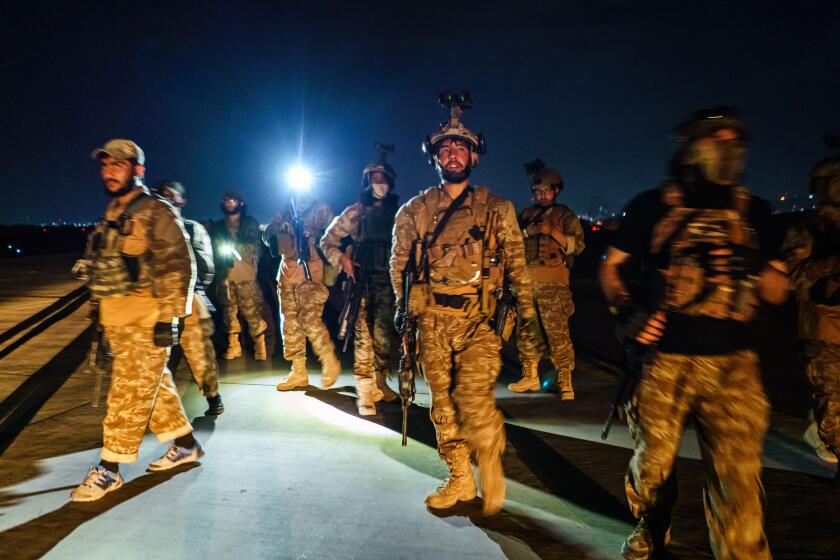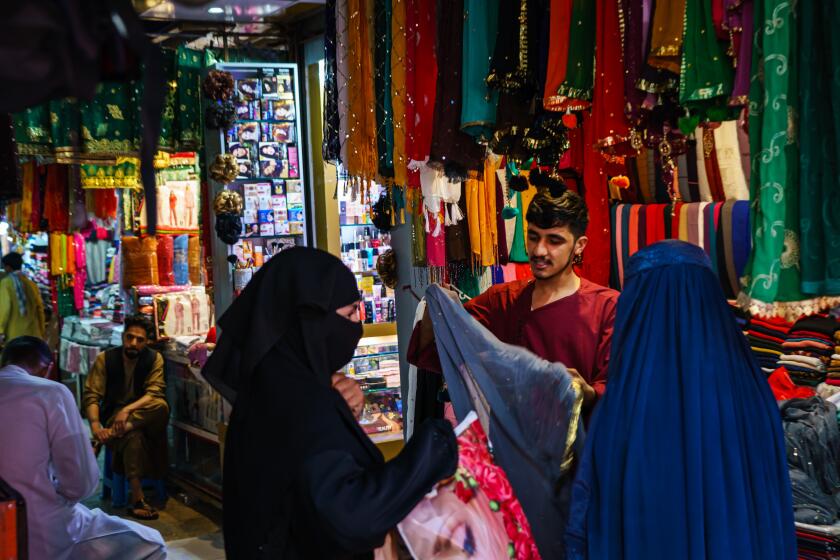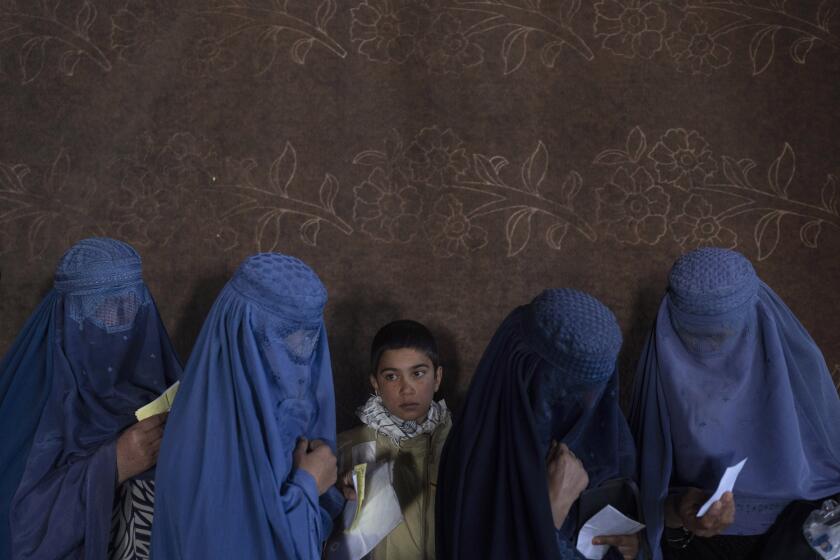- Share via
PARIS — Last year, two decades after the U.S.-led invasion of Afghanistan, they were finally leaving. The Taliban was mounting its comeback, gobbling up territory across the country and closing in on the capital.
Its fighters arrived in Kabul on Aug. 15, setting off a chaotic exodus by artists, journalists, rights activists — anyone who embraced Western ideals or whom the new rulers might see as a threat. More than 120,000 people fled in a series of airlifts over the next two weeks.
They had no choice but to leave most of their possessions behind. The items they took with them often had deep personal value, and in ways large and small, connected them to their homeland.
The refugees are scattered around the world. Here are the stories of four of them who wound up in Paris and the objects they carried to remember.
Two T-shirts
Mursal Sayas crammed what she could into her bag: a laptop, identification and other paperwork, jewelry, some clothing.
As time was running out, she reached into a pile of dirty laundry and grabbed two tiny T-shirts.
They carried the scents of her children. The red shirt belonged to 6-year-old Mohammad, who loved kissing her eyes. The black shirt was worn by 3-year-old Mehrsa, who had magnificent curly hair.
She felt she had no choice but to leave the children behind. She was an employee of the Afghanistan Independent Human Rights Commission, traveling the country to work with soldiers, police and anyone else who would listen — a job that would almost certainly make her a target for the Taliban.
For the record:
2:38 p.m. Aug. 15, 2022An earlier version of this article said Mursal Sayas fled Afghanistan without her children because there was no room for them on her evacuation flight. She said her ex-husband insisted that they remain with him in Afghanistan. The article also incorrectly stated that she is writing a novel. It is a work of nonfiction.
She said her ex-husband insisted that the children remain with him in Afghanistan.
“When they went with their father, I knew that it was the last time I see them,” she said recently.
Now 27, she lives alone in Paris in a small apartment near the Eiffel Tower. She is taking yoga and boxing classes, studying French and writing a book about violence against Afghan women.
“I have myself,” she said. “I don’t have my children. I don’t have my job. I don’t have my family. My parents who supported me and helped me. I don’t have my sisters. I was working for their future. I don’t have my brothers. No one.”
Alone in the U.S., two brothers from Afghanistan struggle to make a life, balancing work, child care and immigration worries.
She talks to her children by phone each day and hopes she will see them again before they are grown up. Her son recently told her that a mother who loved her children would never leave them. She hopes that someday they will understand.
Smell is the sense most closely associated with memory. When the family was still together, her son once told her, “Mother, when you’re not in the house, I smell your clothes.”
And now Sayas smells their clothes.
Before she goes to bed every night, she looks at pictures of them, pulls out the unwashed T-shirts and buries her nose in them.
A digital audio recorder
It was early morning when journalist Asad Kosha received a call informing him that Taliban forces had arrived in Kabul.
“They are in the western part of the city,” said his source, a member of the Afghan intelligence agency. “Take care.”
Kosha had never felt more terrified. He and the editor of his newspaper needed to calm their nerves, so they shared a glass of whisky.
Then he went home and started packing.
He loaded his bag with some pictures of his parents and siblings, a copy of Tolstoy’s “War and Peace” and a few other books. He had to get to the French Embassy, where a bus was waiting to take him to the airport.
He looked around his room and spotted his digital audio recorder on a table.
The Sony recorder had cost Kosha $35 at a market one hot summer afternoon about five years earlier. He had used it ever since to do his work.
“When I looked at the recorder, then all of a sudden, all those pictures, the memories, everything, people I had talked to, they become alive before my eyes,” he recalled.
Before the Taliban took over, the newspaper he worked for, Etilaatroz, had thrived despite the financial challenges in Afghanistan. It won international awards for exposing corruption. Kosha felt as though he was helping build a democracy.
Today the newspaper is headquartered in Maryland and its staff members are sprinkled around the world, covering their country from afar.
With the Taliban back in power and its Al Qaeda allies getting a new lease on life, the situation in Afghanistan will get worse before it gets better.
Kosha, 37, lives by himself in a town just outside Paris and spends most of his time working on a memoir. He said that without the sense of purpose reporting gave him, he sometimes feels like a loser.
Then he picked up the recorder and began to recount the stories he had covered with it.
“I interviewed many, many people with this recorder, including a mother in Herat whose son was hanged” in Iran, he said.
When an old woman once came into his office to complain about “strong men” illegally occupying her apartment, Kosha recorded an interview with her, and the story he published helped rectify the situation.
“This recorder is my connection with journalism,” he explained. “And for me it is a tool through which we can tell the truth. We can change something.”
Now he uses the recorder to leave himself voice notes and collect interviews with fellow refugees.
“Once I get my papers, then I can easily travel around Europe, but my focus would be on working to try to tell people’s stories,” he said. “To do what I can do.”
A necklace
As the Taliban was advancing on the Afghan capital, Atefa Hesari asked her theater professor at Kabul University for advice.
“What should we do? We are artists,” she said. “If Taliban see us, Taliban catch us. They will kill us.”
The professor tried to reassure her everything would be fine. People knew her. She had acted in two films and had worked as a television presenter for the ministry of culture.
But an hour later a friend called with the news that the Taliban had entered the city and urged her to go home immediately. He said her life was now in danger.
The streets were jammed with traffic and people running from their workplaces. It was almost impossible to find an empty taxi.
Hesari worried that her modern clothing would make her a target for the Taliban fighters.
Finally she ran into her friend Sadat, a man who two months earlier had professed his love for her and proposed marriage, an offer she rejected because they came from different ethnic groups. He drove her home as the city fell deeper into chaos.
When they arrived, she didn’t dare shake hands with him — in case the Taliban was watching.
She simply told him “goodbye,” then went straight into her room, locked the door and wept.
She packed her traditional Afghan clothes and a few pieces of jewelry — things that made her feel beautiful.
A year later, she lives in the suburbs of Paris and is enrolled in an educational program for the arts. She is 24 and shares an apartment with another Afghan woman, also a refugee. All her family — her brothers, her sister, her parents — remain in Afghanistan.
There is barely anything on the white walls of her apartment. For comfort, she examines her jewelry. There is one item that stands out: a necklace made from black stones.
The burqa order confirms the worst fears of rights activists and is sure to complicate the Taliban’s dealings with the international community.
Sadat had given it to her when he proposed, and told her to keep it as a symbol of their friendship.
“It is funny for me right now,” she explained. “Just a black necklace. But I bring it, maybe because I feel that it is important for me.”
Sadat remained in Afghanistan, and the two do their best to keep in touch. At one point, he stopped replying to her messages, and she learned that he had been beaten by Taliban police.
“He’s in danger now in Kabul,” Hesari said.
A coffee cup
Mina Rezaie was waiting at the French Embassy to be evacuated when she realized that she had forgotten to pack one essential item.
So she left, crossing the city to return one last time to the coffee shop she owned. There she grabbed a ceramic white mug inscribed with a logo of a bird and the name of the business: “Cafe Simple.”
She had launched it five years earlier, staffed it with women and watched it grow. It became a meeting place for activists and journalists — and a source of empowerment for women in a male-dominated society.
“The cafe was the place through which I established my career and proved the patriarchal society wrong — that we can work, we can run businesses,” she said.
That message was antithetical to the ideology of the Taliban. And so Rezaie joined the exodus.
Now she is 32 and lives with other refugees outside Paris. With her boots, nose ring and army-green pants, she easily blends in to the city.
Former customers send her messages from around the world, lamenting that their beloved coffee shop is gone.
Amnesty International says the Taliban’s ‘suffocating’ crackdown on the rights of Afghan women and girls is destroying their lives.
The mug sits on a bookshelf beside a photo of her family.
“This cup carries a lot of stories,” she explained. “The story of my cafe where people would come. Young men and women would come and drink coffee and they were happy in a free Kabul that is no longer free.”
Then she started to sob.
“Sometimes I feel guilty that I’m not there,” she said. “But when I sit alone and think deeply, I come to a conclusion that the game is over for me, for women in Afghanistan.
“I left myself and my whole life behind in Kabul. I’m not the same Mina now. My soul stayed in Kabul.”
More to Read
Sign up for Essential California
The most important California stories and recommendations in your inbox every morning.
You may occasionally receive promotional content from the Los Angeles Times.


















